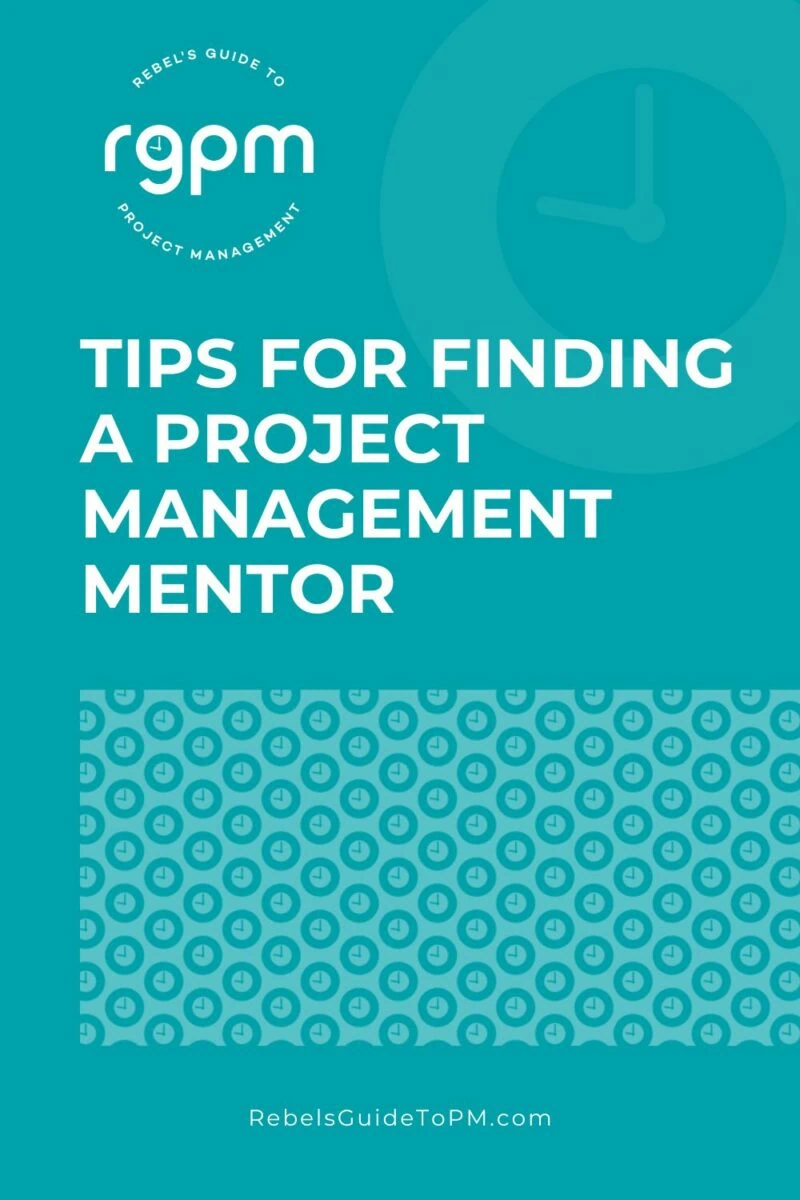Do you want a project management mentor? Read these tips first!
Mentoring is one of the top enablers that improve project performance, but only 48% of organizations have a mentoring or coaching scheme in place to support professional development, according to PMI’s Pulse of the Profession 2024 report.
So how do you build a professional relationship with a mentor, and where do you even find one? I’ve been mentoring project managers for over a decade, and I’ve worked with in-house colleagues and independently to support their career development, so I know what it takes to be a good mentor. And I know how people find me!
The best way to find a project management mentor
Spoiler alert: The best way to find a project management mentor is the way that actually results in you getting a mentor, and you might have to try a couple of different ways (and mentors) before you find one that fits.
The most common routes for finding a mentor are in-house schemes, workplace arrangements, professional bodies or independent mentoring programs.
1. Use an in-house formal company scheme
If your company has a formal mentoring or coaching program, then the best approach is going to be applying to be partnered with a leader from that.
Find out what the eligibility criteria are and talk to your manager about applying. Be aware, though, that there are normally more people who want mentors than there are mentors available.

2. Find your own mentor from within your company
Let’s say your company doesn’t have a mentoring scheme. That doesn’t stop you from going out and finding a mentor yourself.
Look at the people in jobs a couple of levels above yours, and preferably in a different directorate or department so you have a bit of distance.
Junior project managers might benefit from building mentoring relationships with senior project professionals in different teams, with PMO leaders, or other people who have industry experience in the field.
Ask if they would be prepared for a workplace arrangement where you schedule some mentoring sessions for career coaching. You might be surprised at what they say!
3. Use the mentoring scheme for your professional body
Another option is to check out whether your professional body provides a mentoring program.
APM has a mentoring program that is housed within its community center and is for fee-paying members. You can read through the profiles of people offering their professional experience as a carer mentor, and make an application.
Then the mentor will contact you via the platform and arrange a chemistry call to see if you would be a good fit. Mentors are volunteers, and they might not be able to take on a mentee at the time, but it never hurts to ask.
PMI Chapters also have locally run mentoring programs.
4. Seek out an independent mentor
For full impartiality, you could look for an independent project management mentor, like me.
One of the reasons my mentees ask me for support is that they don’t want to talk about their work challenges with people from their workplace. Perhaps they are worried that the conversation might get back to their boss if they confide in a colleague in the same office. Perhaps they want to know what other people do, as their in-house process doesn’t seem to be working optimally. Or perhaps they simply want an impartial opinion.
Mentoring platforms or individual professionals may offer project management mentors in your area or online, but be very careful before giving your personal details to someone you met on the internet!
Check the credentials and work experience history of the mentor you are considering approaching to see if they have the project management skills and practical experience to offer you advice at this point on your career path.
Regardless of how you meet your mentor, you need to be clear on what you want from them.

Set expectations about what mentoring can do for you (both)
Mentoring should provide the opportunity for both parties to get something out of it. Think about what you have to offer and set out what you want from the mentor. Managing expectations at the early stages will help you both.
Here are some tips that work for me and my mentees.
1. Know your career goals
If you don’t know what you want, you can’t expect your mentor to magic up a development plan for you. Think about your career goals. They don’t have to be big and lofty, or part of a 5 year plan. They could be simple like:
- Feel confident managing project initiation meetings
- Organize a lunch and learn session for my team
- Pass my Project Management Professional (PMP)® exam.
2. Arrange meetings – they really don’t have to be regular
With an in-house program, you will probably find some guidelines that say you should meet your mentor monthly. If that’s the approach everyone uses and is comfortable with, great. I build long-term, successful relationships with the mentees I talk to regularly.
However, project management is a bit different. You might be fine managing this project, but feel like you need some support when you’re kicking off a new piece of work.
You might have had a great career, but are now facing redundancy or want to get a promotion – and there simply isn’t the opportunity to stay where you are.
Those are ad hoc, life/career moments, so with my independent mentees, sometimes we go 6 months without talking and then will have a couple of calls in a month. Sometimes we can solve a problem in a single call, and I don’t need to meet them again!
Just book the sessions in a way that meets your development needs. As long as your mentor is happy with the cadence, it’s fine.
3. Own the learning process
Take your own notes. It’s your career. The mentor is not going to apply for jobs for you, or run your next strategic planning meeting.
I take my own notes when I am mentoring, and I send these on to paying mentees because I think it’s important they focus on the discussion and not solely on having to write things down. Plus, it helps when I look back so I can see what we talked about last time.
Sometimes, if we’re looking over documents or working collaboratively on a CV or resume, I won’t write additional notes. Either way, it’s useful to acknowledge that to do the work, the mentee has to actually do the work.
How to find a project management mentor for free
There are a couple of options for finding a project management mentor for free.
The easiest one is to talk to your manager and join an in-house company mentoring program or to find a mentor within your existing organization. You can do this even if you aren’t a project manager today.
If you are a PMI Chapter member, talk to them about the opportunities they provide for partnering
Another option is to use the information that is widely available on the internet, such as YouTube channels (like this one, this one and this one). Or you could get bespoke answers to your questions using AI tools.
Make use of AI tools for mentoring support
Tools like Microsoft Copilot and ChatGPT can act as project management advisors. Large Language Models help the least experienced employees the most. Research shows that less experienced staff showed a 43% improvement in performance when using LLMs, which is pretty good!
However, the output of generative AI tools is only as good as the base it has been trained on, and there is a lot of dodgy content on the internet. PMI Infinity is a generative AI tool that has been trained on professionally-written project management content and is a reliable source of data.
You’ll also have to get good at writing prompts, and remember that your company confidential information shouldn’t go into a publicly-available generative AI tool because it might be used for training the model – and what company exec wants their sensitive project details all over the internet?
Making a good match
You don’t just want any mentor – you want the right mentor for your career journey.
Think about the professional growth you want to achieve and who in your network might be able to offer that. What project management processes do you use or want to learn? Maybe someone skilled in
Then think about personalities and other characteristics:
Would you rather have a same sex mentor? The challenges women face as project managers are unique to those facing men at work, so if that’s part of what you want to discuss, it halves your pool of potential mentors.
What about age? Race? Location?
Who in your project management community could provide career advice that speaks to you?
Do you want someone with a direct style? Someone who will handle you gently? Someone whose personal life mirrors yours, perhaps a working parent or someone with caring responsibilities?
Perhaps you want someone as different from you as possible!
There are a wide range of people out there who have the project management knowledge to answer your questions, so it might take a couple of matches before you find someone who is a good fit for you.
Have an introductory call with them without making a broader commitment and then see if you click.
Your next steps
Now you’ve got your project management mentor, it’s time to put that relationship to work and leverage their knowledge and network!
Use my list of questions to ask a mentor to get started thinking about how you can learn from them.
If you’d like to book a call with me, you can do that here: Book a Power Hour
